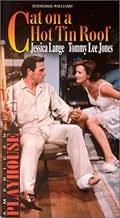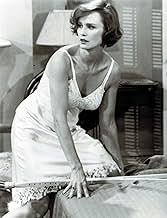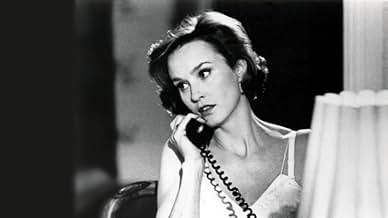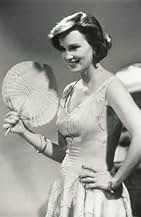An alcoholic and femme fatale face troubles before a family reunion.An alcoholic and femme fatale face troubles before a family reunion.An alcoholic and femme fatale face troubles before a family reunion.
- Won 1 Primetime Emmy
- 1 win & 7 nominations total
- Director
- Writer
- All cast & crew
- Production, box office & more at IMDbPro
Featured reviews
10peacham
Forget The watered down film version from 1958. forget the ridiculous tacked on "happy" ending between Newman and a Miscast Liz Taylor...This is the ultimate film version of Williams greatest play. The screenplay is direct from William's outstanding revised 1974 text with one of the greatest ending scenes in theatre history. Tommy Lee Jones has never been better than as the alcoholic Brick Pollitt. Jessica Lange is so sexy,manipulative and tortured as Maggie that you don't know if you want to hit her or make love to her. the agony put forth in these two characters manifests itself to perfection in these perfect actors.
As wonderful as Jones and Lange are, they are still outdone by Rip Torn as Big Daddy. 'He's never turned gentleman." Maggie says of her father-in-law and thats the honest truth in Torn's magnetic,engaging and touching performance. His Act II scene with Brick is some of the best screen acting I have ever witnessed. Kim Stanley gives us a very human and warm Big Mamma, unlike Judith Anderson's cold matriarch in the 1958 version and Penny Fuller and David Dukes ooze bile as the Greedy Gooper and Mae. This is a film to be watched over and over. Finally a CAT ON A HOT TIN ROOF on screen William's could be proud of !
As wonderful as Jones and Lange are, they are still outdone by Rip Torn as Big Daddy. 'He's never turned gentleman." Maggie says of her father-in-law and thats the honest truth in Torn's magnetic,engaging and touching performance. His Act II scene with Brick is some of the best screen acting I have ever witnessed. Kim Stanley gives us a very human and warm Big Mamma, unlike Judith Anderson's cold matriarch in the 1958 version and Penny Fuller and David Dukes ooze bile as the Greedy Gooper and Mae. This is a film to be watched over and over. Finally a CAT ON A HOT TIN ROOF on screen William's could be proud of !
I have an extraordinary attachment to this play. Aside from being my all-time favorite, which I have read at least fifty times, I was also cast as Big Daddy for an attempted high school production, which, fittingly enough for the history of the play, I suppose, was cancelled and replaced with something "more appropriate" under pressure from the school's administration. I saw the original Newman-Taylor version after reading it the first few times, but had heard a lot of raving that the 1958 film was horrible and that this was worlds better. I found a laser-disc copy and watched it this afternoon. I definitely have more complaints with this performance than I expected. I personally wish that the Rip Torn of 'The Insider' and 'Wonder Boys' had been present in the role of Big Daddy, rather than the version I saw, who despite playing the role with an enormous passion, produced a performance which saw his accent slide all over the place, from a few moments of European immigrant on one misguided extreme to Chris Kattan's incomprehensible sketches on SNL at another, the original lines by Tennessee Williams often escape him, and overall, it results in a very streaky and inconsistent characterization. Perhaps this is a result of being filmed live, or perhaps it's a Rip Torn without an additional fifteen years of experience. Jessica Lange also turned in an impassioned role, but she also seemed rather inconsistent. I actually longed for a little of Liz Taylor's cattiness in the first act, but the play as a whole I preferred Lange. My only quibble with Tommy Lee Jones was that he did not seem to make a decision whether Brick was indeed homosexual or not, which I think is important, because the issue of homosexuality, although the most controversial aspect, is not so crucial to the play as the issues of mendacity dissolving his friendship with Skipper. The two are interrelated, but while the belief that Skipper was homosexual would cause him to question his own sexuality, there were times when Jones seemed to actually believe the allegations, moreso than I would have expected from the character. Gooper, Mae, and Big Mama all were the finest I've seen those roles played. The other complaint was with some of the production values. I was glad that it was done realistically rather than expressionistically as Kazan first directed it on Broadway, but the liquor cabinet and bed are supposed to both have an awesome presence on the room, and neither does in this film, nor does the bedroom have the quality of "pale light on weathered wood" Williams specified in the production notes. Also, Big Daddy's entrance in a baseball cap seemed entirely out of place. Worst, however, was the soft-focus quality of the camera. There are some questionable directorial decisions, things I think could have been staged better, but the essence of the play shines through, and most importantly, the third act is nearly flawless. The passionate conflicts that Williams weaves together are communicated, and the play is so good that nearly any group, probably even my little high school troupe, could have moved an audience, even if not displaying master craft.
Just as Stanley Kowalski and Blache du Bois will be forever associated with Marlon Brando and Vivien Leigh, so too will Brick and Maggie be with Paul Newman and Elizabeth Taylor. These are performances that define the meaning of definitive which of course poses an insurmountable problem for anyone attempting to recreate those roles. One has to approach a revival of "Streetcar" or "Cat" with the foreknowledge that the principals will more than likely fall short. It's more a question of just how short.
Jessica Lange falls shorter than one might expect although not for want of trying. That in fact is the major problem with her performance. One is constantly aware of just how hard she's trying. There's far too little cat in her "Maggie the Cat". In a bit of misdirection she takes to using her hands to make cat like movements. The result is ungainly and fails to compensate.
As Brick, Tommy Lee Jones' limitations have never been more evident. It's impossible to believe that he has any real sexual ambivalence which is the very heart of the character. His speeches concerning his buddy Skipper have no emotional truth whatsoever. It is a heartless performance. I saw Brendan Fraser battle with the part on the stage. He failed to make it work, but fared far better than Jones.
Burl Ives' marvelous portrayal of Big Daddy is too a definitive one. From Rip Torn, an actor with a wealth of experience one certainly could have expected a lot more. For some reason he is presented as scruffy and unkempt. This is hardly the imposing figure that Williams intended, one that commands respect and flaunts his power as head of the family. But worse still was his way over the top acting. Like Jones, he too lacked any sense of inner truth.
Before touching on the one redeeming feature of this production a word must be mentioned about the Southern accents used. I don't profess to have a deep knowledge as to the accuracy of the ones on display here. But I do know that from the first line to the last one is constantly aware of these accents. They seem to be greatly exaggerated and rather than lend a certain Southern charm they soon begin to grate on the nerves. They simply do not come off as natural and hamper what is already a very problematic production.
And finally, Kim Stanley. While Lange, Jones and Torn never stop acting for a minute, Kim Stanley simply is Big Mama. And that, of course, is what separates the men from the boys. Judith Anderson was superb in the screen version and yet Stanley manages to recreate the character as her own. While the other actors present caricatures, she becomes a real person before our eyes. There is precious little on film of Kim Stanley's performances which is, in the final analysis, the only worthwhile reason for seeking out this version.
Jessica Lange falls shorter than one might expect although not for want of trying. That in fact is the major problem with her performance. One is constantly aware of just how hard she's trying. There's far too little cat in her "Maggie the Cat". In a bit of misdirection she takes to using her hands to make cat like movements. The result is ungainly and fails to compensate.
As Brick, Tommy Lee Jones' limitations have never been more evident. It's impossible to believe that he has any real sexual ambivalence which is the very heart of the character. His speeches concerning his buddy Skipper have no emotional truth whatsoever. It is a heartless performance. I saw Brendan Fraser battle with the part on the stage. He failed to make it work, but fared far better than Jones.
Burl Ives' marvelous portrayal of Big Daddy is too a definitive one. From Rip Torn, an actor with a wealth of experience one certainly could have expected a lot more. For some reason he is presented as scruffy and unkempt. This is hardly the imposing figure that Williams intended, one that commands respect and flaunts his power as head of the family. But worse still was his way over the top acting. Like Jones, he too lacked any sense of inner truth.
Before touching on the one redeeming feature of this production a word must be mentioned about the Southern accents used. I don't profess to have a deep knowledge as to the accuracy of the ones on display here. But I do know that from the first line to the last one is constantly aware of these accents. They seem to be greatly exaggerated and rather than lend a certain Southern charm they soon begin to grate on the nerves. They simply do not come off as natural and hamper what is already a very problematic production.
And finally, Kim Stanley. While Lange, Jones and Torn never stop acting for a minute, Kim Stanley simply is Big Mama. And that, of course, is what separates the men from the boys. Judith Anderson was superb in the screen version and yet Stanley manages to recreate the character as her own. While the other actors present caricatures, she becomes a real person before our eyes. There is precious little on film of Kim Stanley's performances which is, in the final analysis, the only worthwhile reason for seeking out this version.
Tennesee Williams is, without a doubt, one of the best writers of the 20th century. Cat on a Hot Tin Roof has always been my personal favorite. This particular version first came out as part of a project that premium cable (Showtime I think) was doing in its early years. If I'm not mistaken, the performance was taped live in an effort to create a live theatrical atmosphere. I bring this up because it will explain to those who care why it looks so much like a soap opera, only with good writing.
Aside from the somewhat cheesy production level, this is one of the best adaptations I have ever seen of a play to television. It couldn't be better cast. The performances are excellent. Even the DX-7ish sounding music score has a sultry feel to it that matches the setting beautifully.
My first experience with this play was, like many I suppose, the film version with Paul Newman, Elizabeth Taylor, and Burl Ives. Even in that watered down version, the play had power, so I went to rent it to check it out more thoroughly. The video store had this version of it instead. When it first played on TV, I was much too young to really appreciate the power and raw emotion of the story in its pure form. I never would have guessed the movie was so bad. Burl Ives, after all, played Big Daddy in the original production. Unfortunately, the people who made the movie were apparently either too scared or too hampered by censorship concerns and star egos to present a workable facsimile of the original. I can understand axing the ambiguously homosexual relationship that has cast Brick into his alcoholic nose dive, I suppose, though the story loses almost all of its power because of it. I cannot, however, understand giving Big Mama's only sympathetic line in the whole play over to Elizabeth Taylor, who now strikes me as badly miscast in the role.
I should point out, however, that even this version is not exactly what Williams wrote. In this case, though, that is to its benefit. Williams' original version did not have Big Daddy in the final scenes. The original director, Elia Kazan, wanted him back, so Williams, since he liked the character anyway, obliged him. The scene as rewritten, however, never struck me as quite as good as Williams' original effort. This version has taken the best of both of those versions, a few nicely written lines that were added to the movie version and melded them into a superb synthesis whose presentation is most assuredly greater than the sum of its parts. I hate hearing this play end any way other than Maggie telling Brick she loves him, and Brick replying, "Wouldn't it be funny if that was true?"
All in all, this was a magnificent effort. I only regret that premium cable did not keep up the good work.
Aside from the somewhat cheesy production level, this is one of the best adaptations I have ever seen of a play to television. It couldn't be better cast. The performances are excellent. Even the DX-7ish sounding music score has a sultry feel to it that matches the setting beautifully.
My first experience with this play was, like many I suppose, the film version with Paul Newman, Elizabeth Taylor, and Burl Ives. Even in that watered down version, the play had power, so I went to rent it to check it out more thoroughly. The video store had this version of it instead. When it first played on TV, I was much too young to really appreciate the power and raw emotion of the story in its pure form. I never would have guessed the movie was so bad. Burl Ives, after all, played Big Daddy in the original production. Unfortunately, the people who made the movie were apparently either too scared or too hampered by censorship concerns and star egos to present a workable facsimile of the original. I can understand axing the ambiguously homosexual relationship that has cast Brick into his alcoholic nose dive, I suppose, though the story loses almost all of its power because of it. I cannot, however, understand giving Big Mama's only sympathetic line in the whole play over to Elizabeth Taylor, who now strikes me as badly miscast in the role.
I should point out, however, that even this version is not exactly what Williams wrote. In this case, though, that is to its benefit. Williams' original version did not have Big Daddy in the final scenes. The original director, Elia Kazan, wanted him back, so Williams, since he liked the character anyway, obliged him. The scene as rewritten, however, never struck me as quite as good as Williams' original effort. This version has taken the best of both of those versions, a few nicely written lines that were added to the movie version and melded them into a superb synthesis whose presentation is most assuredly greater than the sum of its parts. I hate hearing this play end any way other than Maggie telling Brick she loves him, and Brick replying, "Wouldn't it be funny if that was true?"
All in all, this was a magnificent effort. I only regret that premium cable did not keep up the good work.
Wonderfully acted stage production of Williams' classic play. This first aired on Showtime in 1984 or 1985 and I can still recall being a small boy absolutely loving this. Lange is so fiery (and even humorous) in her role as Maggie and Jones is so full of emotional and physical pain as Brick. The other performances are just as solid. Beautiful set designs and nice southern music add on to the positive elements of this great drama.
Did you know
- TriviaThe original play "Cat On A Hot Tin Roof" by Tennessee Williams opened at the Morosco Theater in New York on March 24, 1955, ran for 694 performances and was nominated for the 1956 Tony Award (New York City) for the Best Play. The play also won the Pulitzer Prize in Drama in 1955.
- GoofsShadow of boom mic is seen on Brick.
- ConnectionsEdited into American Playhouse: Cat on a Hot Tin Roof (1985)
Details
- Release date
- Country of origin
- Language
- Also known as
- American Playhouse: Cat on a Hot Tin Roof
- Production companies
- See more company credits at IMDbPro
Contribute to this page
Suggest an edit or add missing content































